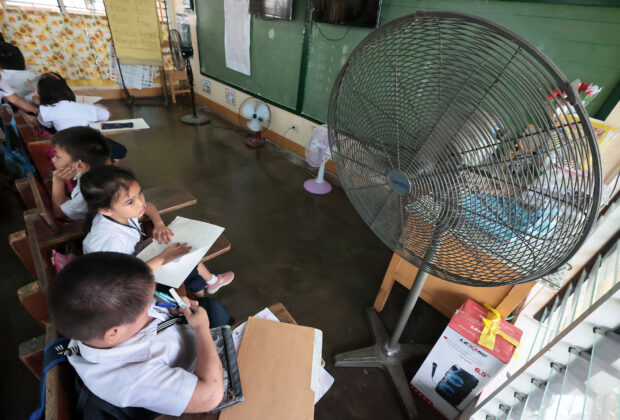
FANS OF ALL SIZES | Grade 1 pupils at Pinyahan Elementary School in Quezon City finish their seatwork on Monday without worrying too much about the summer heat as their classroom is cooled down by several electric fans in the absence of expensive air-conditioning units. —(Photo by GRIG C. MONTEGRANDE / Philippine Daily Inquirer)
MANILA, Philippines — As students and teachers suffer in packed classrooms under the sweltering heat, the Department of Education (DepEd) has dismissed a proposal to install air conditioners in public schools, citing insufficient funds.
“Even though the schools have MOOE (maintenance and other operating expenses), it would not be enough to put air conditioning [units] in all our classrooms,” DepEd spokesperson Michael Poa said on Monday.
He was reacting to comments made by Willy Rodriguez, president of the Parents-Teachers Association (PTA) Federation, who suggested air-conditioned classrooms as a solution to class disruptions due to the hot and humid weather.
“The solution is not calendar change or modular [learning]. The solution is to have air-conditioned classrooms for public schools. As you can see, private schools have no complaints,” Rodriguez said in a radio interview.
He added that it was “easy” to obtain air conditioners, noting that in 2013, his group managed to collect new and used units to be installed in some classrooms.
Not practical or easy
But the president of a PTA in a Quezon City elementary school said Rodriguez’s suggestion was neither practical nor easy.
The PTA official, who asked not to be named, said her school previously tried to install an air conditioner in one of its special education classrooms but the plan did not materialize as it required structural changes to the building and fixing electrical wiring to safely ensure enough power supply.
She said the principal had also pointed out that the school would need to coordinate with the power distributor on energy consumption requirements.
An air conditioner with 1 horsepower costs between P17,000 and P20,000. Installing this would entail labor cost and would mean added charges to the school’s monthly electric bill.
In the end, the PTA official said her school settled for a blended approach: two days of online or modular classes and three days of physical classes.
In other schools in the area, school heads were looking at adding more electric fans in each classroom or shortening class hours, she said.
DepEd reiterated that school officials had the authority to suspend in-person classes and implement alternative delivery modes in case of intolerable weather.
Poa said the department was still studying a recommendation to revert to the old school calendar, in which case the school break would be in April and May and students would have to brave the rainy months.
Vladimer Quetua, chair of the Alliance of Concerned Teachers, said the heat was causing a number of ailments among students and teachers, such as dizziness, high blood pressure, nose-bleeding and asthma.
He said DepEd should build enough classrooms to reduce class size, improve ventilation systems and set a “most favorable” school calendar.